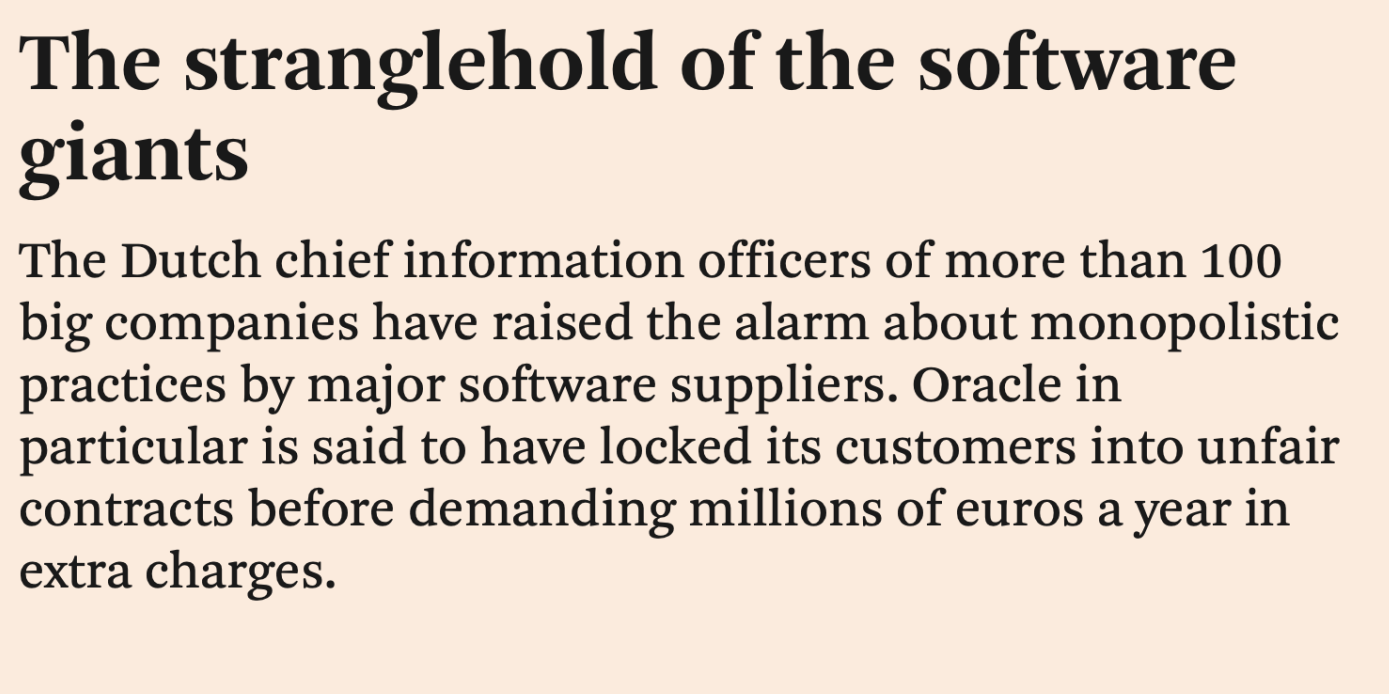Today, the FD (the renowned Financial Daily – who also participated in the Panama Papers) published a long article (english version here) for which I was also interviewed. Apparently the Dutch CIO Platform, representing over 100 of the largest dutch companies including Shell, KLM, Philips, NXP ASML and 4 ministries are discussing ’s widely criticised sales- and audit practices with the European Commission reporting bullying, anti-competitive and market disturbing behaviour from Oracle. Client specific conflicts are exposed, including legal disputes that have occurred in several countries. It is expressed that One CIO who is cited about how doing business with Oracle is experienced:
“It is as if you believe you bought a chicken. Then, while you’re cooking, you get a message from the supermarket that on closer inspection it turns out to be three chickens and they have also turned into turkeys. And you get a bill for that.”
Many large organisations stated that, as result of Oracle’s practices, they would like to abandon Oracle if they could. I know that this is the case, but that at the same time know that overall the IT people value the performance and reliability of Oracle’s software. The article states also that compliance claims have come to raise questions with financial auditors, quoting one of the CIO’s:
”The auditors of annual financial statements have more and more reservations about the ever-increasing costs arising from the audits, without the company being able to explain exactly what the amount is based on.”
As predicted, Oracle would not respond to the article other than saying ‘we have a great cloud platform for you’. Serving clients in over 30 countries, we’ve known for many years that this problem spans around the globe and are aware that all users of Oracle software – including goverments but basically every business – would appreciate fair and square answers to Oracle’s licensing practices….other than Oracle’s most obious an$wer$. After all, much of our data (including citizens financial- and governmental data) is ever suitable to be stored in a cloud. @Eurocommissioner Margarethe Vestager, please consider the following for review:
Virtualization – bullying and anti competitive behaviour
Oracle is using endorsing anti competitive behaviour by forcing clients to use Oracle VM over other hypervisor technologies such as those including those from VMware and Microsoft.
Being the most impactful misconduct from Oracle today, this phenomenon results in a scenario where Oracle claims license fees for an entire data center when in reality only a fraction of that data center is running Oracle software: No contractual agreements support this practice: Only a home-grown white paper by Oracle suggests this, which is then used by Oracle’s audit and sales team as if it were a contractual fact (despite it’s footnote!).
Example: A company has an Oracle-dedicated cluster has 50 Oracle-Processors where the Oracle database Programs are exclusively running. The cost would be 50 * $47500 = $ 2.375.000. On other clusters, another 500 Processors are used for different purposes – running SAP, Open Source databases and things unrelated to Oracle. Oracle will claim all 550 Processors and charge $ 26.125.000 (YES!) – even when the signed agreement states that the client must only pay for “…Processors where the Oracle Programs are installed and/or running”. Not to mention that thereafter the annual support fee payable to Oracle is 22% of the price paid.
Unfair behaviour in Non-Oracle Clouds
In another white paper (recognize the footnote?), Oracle suggests there is a ‘special’ pricing model for the cloud. This results in a much higher cost when using Oracle on public cloud infrastructures like Amazon and Microsoft, even when the client already has purchased Oracle Processor licenses under pre-existing conditions which do not contain restrictive acts to utilizing Oracle software Programs on in any way. Until today, there is no contractual distinction between on-or off premise utilisation – let alone between specific cloud service providers. Conveniently, Oracle updates the non-contractual documents to double its income whenever necessary.
Oracle Disaster Recovery licensing
Oracle mandates – yes by white paper (boring footnote by now) – that companies are required to fully license DR environments: Even when clients just test if they would work in case of a true disaster. Our initial thoughts were scribbled in 2014, after which we read several opinions from law firms that – based on Article 5 Directive 2009/24/EC of the European Parliament and of the Council of 23 April 2009 on the legal protection of computer programs, such practice is unlawful. The only legal analysis available online dates from this year and can be found on our website.
OK but this will take years. What now?
- Don’t wait for Oracle. As illustrated 3 years ago already, there is too much money at stake for Oracle to change course.
- Until there is case law or findings by the European Commission, do yourself a favour and read your contract. It probably stipulates that in the event of a dispute you must send a prompt written notice to [Oracle Legal / Address]. Do it.
- Ask Oracle legal to for a contractually substantiated explanation of the claim. You will that in over >90% of the cases Oracle’s legal counsel won’t be able to substantiate claims, allowing you to sleep well thereafter. And throw the audit- and commercial claims into the trash.
- If you want a template for your letter, reach out to me for a template to get you going. It’s free for the asking.
If all of you forward this article to @Margarethe Vestager saying it’s worthwhile looking into it we’ll probably end up with less business around audit defense……but a much better world.
Truly yours,
License Consulting














